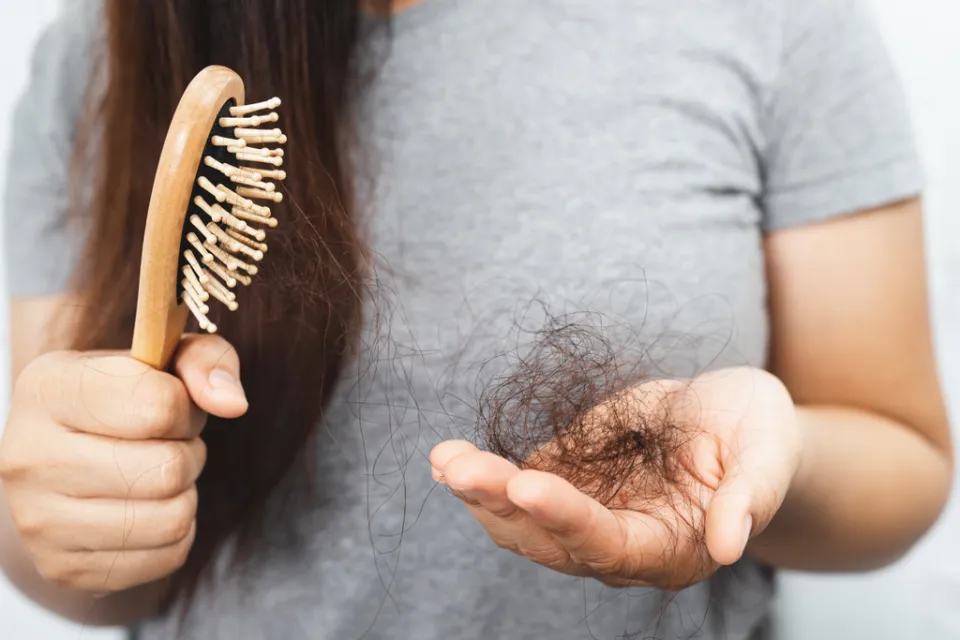The appetite is suppressed by the weight loss drug phentermine. Does phentermine cause hair loss?
Hair loss is not an official side effect of phentermine, but many patients notice a link between phentermine use and hair thinning or falling out in clumps.
Continue reading and find out more about the relation between Phentermine and hair loss.
What is Phentermine?
Phentermine is in a class of amphetamine-like drugs called anorectics. People who are already trying to lose weight through a balanced diet and regular exercise are prescribed weight loss medication.
For those who are already implementing healthy eating habits, it can help speed up the weight loss process by decreasing their appetite.
Phentermine has been proven to be effective at helping people reduce their body mass, even though it may not result in rapid weight loss.
Both tablets and extended-release capsules of this medication are offered. Bear in mind it’s not intended for long-term use and is usually administered for three to six weeks.
Does Phentermine Cause Hair Loss?

At this point, you know phentermine can cause things like nausea and vomiting or, more seriously, blood pressure changes. But can phentermine use result in hair loss or thinning?
The solution isn’t really cut and dry. There is no proof that phentermine use alone results in hair loss.
However, if you take phentermine and lose your appetite, you might not get the necessary amount of nutrients in your diet.
Being deficient in the following vitamins and micronutrients may cause non-scarring alopecia (a type of hair loss):
- B vitamins (such as biotin, folate and vitamin B12)
- Vitamin D
- Vitamin E
- Iron
- Zinc
Vitamins and minerals are essential for maintaining a healthy hair follicle cycle and cell turnover, which explains why this occurs.
When these things go haywire, hair loss can occur.
You Might Also Like:
- Does Lupus Cause Hair Loss?
- Does Pomade Cause Hair Loss?
- Does Caffeine Cause Hair Loss?
- Does Alcohol Cause Hair Loss?
- Does Mounjaro Cause Hair Loss?
- Does Creatine Cause Hair Loss?
- Does Dandruff Cause Hair Loss?
- Does Metformin Cause Hair Loss?
- Does Minoxidil Cause Hair Loss?
- Does Wellbutrin Cause Hair Loss?
- Does Testosterone Cause Hair Loss?
Common Side Effects of Phentermine
The use of this medication for weight loss is accompanied by some common side effects. Some of the more benign phentermine side effects include:
- Vomiting
- Constipation
- Diarrhea
- Dry mouth
- Unpleasant taste in your mouth
It’s also important to watch out for some more severe side effects. They consist of chest pain, leg swelling, high blood pressure, trembling, heart palpitations, insomnia, shortness of breath, and tremors. Call your doctor as soon as you can if you experience any of these symptoms.
Be sure to let your doctor know about any past drug allergies you’ve experienced or existing medical conditions before you begin taking this weight-loss medication.
In this way, they can make sure you won’t react poorly to the phentermine or experience a possible drug interaction.
Does Hair Grow Back After Phentermine?
Yes, hair usually grows back after taking phentermine, but it takes time.
After the course of treatment is complete, the majority of drug-related hair loss resolves naturally. Hair regrowth after phentermine may not begin for 2–6 months after the end of treatment if the damage is caused by telogen effluvium (TE). However, for the first 6 to 8 months following your last dose, shedding should gradually decrease.
Regrowth may not be apparent to you for up to 12 to 18 months, even though a doctor can usually see it after 2-3 months.
As a result, phentermine hair loss may be a more serious problem than the drug’s other known side effects.
Related Reading: Can Hair Loss Be Reversed?
How to Reverse Hair Loss from Phentermine?
If you’re taking phentermine and notice excessive hair loss, the first thing you should do is reach out to your healthcare provider.
It’s crucial to discuss strange symptoms you experience while taking medication. So that they can be monitored and you can receive advice from your healthcare provider, they will do so.
Following are some potential treatment options for hair loss.
Get Enough Vitamins & Nutrients

Do you recall how we said earlier that malnutrition or insufficient nutrients could be the cause of hair loss from phentermine?
Getting the vitamins, minerals, and other nutrients your body requires to stay healthy would make sense.
Nevertheless, it’s critical to be aware that phentermine can interact with other drugs, vitamins, and dietary supplements. The best course of action is to consult your doctor about which vitamins to take or to inform them that you are taking phentermine.
When taking phentermine, eating healthy foods may actually be preferable to taking artificial vitamins and supplements.
Choosing foods high in biotin, zinc, iron, vitamins A, B, and E is also recommended.
Avocado, broccoli, strawberries, citrus fruits, spinach, seeds, nuts, and beans are a few examples of foods that you can eat to boost your vitamin intake.
Stay Hydrated
Your body loses water, a crucial element in many systems, when you are dehydrated, which affects many cells.
Your risk of hair loss may increase or be caused by insufficient water levels.
Therefore, remember to stay hydrated by consuming at least 8 glasses of water daily.
Staying hydrated can lessen your risk of experiencing additional phentermine side effects in addition to aiding in hair loss prevention.
Try a Hair Loss Medication
Another option is to try a non-prescription medication calledminoxidil. Available in liquid or foam formulas, this topical treatment is FDA-approved to treat hair loss.
Minoxidil stimulates your hair follicles to enter the growth phase — aka, the anagen phase. In addition, it increases blood flow to the scalp, which brings nutrients to the hair follicles and encourages growth.
Add a Hair Loss Shampoo to Your Routine
Another easy thing you can do is to stick a hair loss shampoo in your shower. This can be a useful complement to one of the ideas mentioned above.
Conclusion: Does Phentermine Cause Hair Loss
Whatever you decide to try, know this: Telogen effluvium tends to be reversible.
If you experience hair loss during your treatment with Phentermine, you might want to consider consulting your physician.
Using the fantastic advice we’ve provided in today’s article is also a must, along with the other. Don’t wait to take action because if you do, you can easily stop the hair loss process.
FAQs
Does Phentermine Cause Weight Loss?
Yes, because it reduces your appetite, it can aid in weight loss.
Does Phentermine Cause Heart Problems?
Palpitations, slight tachycardia, and increased blood pressure are the main cardiovascular side effects.
How to Stop Hair Loss from Medication?
People who are taking medications that are contributing to hair loss can talk to their doctor about switching to a different medication.




